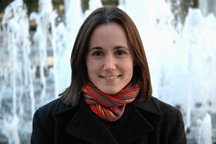A Success Story
Recent graduate career change profile
Students belonging to the “Ambitious Generation” who are Career Literate begin managing their young careers more effectively.
Career Vision client Tanya Lüthi was recently interviewed for a Wall Street Journal article, “The First Job Blues: How to Adjust, When to Move On.” Tanya chose to move on. Here is her story on how she accomplished her re-direction using a career assessment and informational interviews to ensure a smart move.
“I went to college thinking I would major in something math- or science-related, but got sidetracked and wound up earning my bachelor’s degree in political theory from Princeton in 2000. I found it to be an interesting subject, and I knew that college was my only chance to really study something like politics and philosophy. I decided to ignore the “So what are you going to do with that degree?” question I got from everyone.
After graduation, I didn’t want to pursue graduate work in politics, so I decided to take a stab at the nonprofit/foundation world. I wanted to feel like I was doing something worthwhile, but I didn’t spend a lot of time thinking about what kind of actual tasks I would enjoy doing on a daily basis.
It didn’t take me long to figure out that I disliked my job, but I couldn’t clearly articulate why. After taking the Ball Aptitude Battery, I learned a few key lessons. They were things I already knew on some level, but the counseling really put the big picture together for me. The first lesson I learned is that I am a problem-solver, and I need to have a clearly defined problem, with clear indicators of success and clear products or deliverables. The second is that I am very “spatial,” meaning that I always need to see an underlying structure to what I do, and to see how things fit together. The third is that I am off-the-charts detail-oriented. In contrast, the field I had chosen was highly abstract, process-oriented as opposed to product-oriented, and it was extremely difficult to measure success. No wonder I was frustrated!
Architecture was one of the fields recommended by my particular aptitude profile, so I took a summer off from my job and did the Career Discovery program at the Harvard Graduate School of Design. The program is designed for people considering graduate school in architecture, landscape architecture, and urban design. I finished the summer thinking, okay, I want that, but with math! That meant I wanted to be a structural engineer. I tracked down as many structural engineers as I could find, talked to them about what they did, what they liked and didn’t like about their jobs, what skills and talents they thought were necessary to be successful, and what kind of career paths are open to people with structural engineering degrees. Once my decision was made, I talked to graduate engineering programs about my situation, and wound up at the University of Texas at Austin. I needed about a dozen undergraduate courses to get caught up, and then went on to complete a master’s degree in structural engineering.
I am now working for a structural engineering firm in New York City and loving my new profession. Engineering uses my problem-solving skills, it requires attention to detail, and structural engineering is perfect for someone who is highly spatial.
Without Career Vision, I don’t think I would have had the courage to make such a drastic change. The process reinforced for me that I really would be a good engineer, and so I wasn’t completely crazy to pursue engineering after studying politics in college. Had I not gone into engineering, I probably would have continued changing jobs, groping around in the dark and hoping I’d find something I liked! Now I’ve not only found a profession I enjoy, I’ve been “armed” with information about myself that I can continue to use as my career develops.”
Tanya Lüthi, New York, NY
